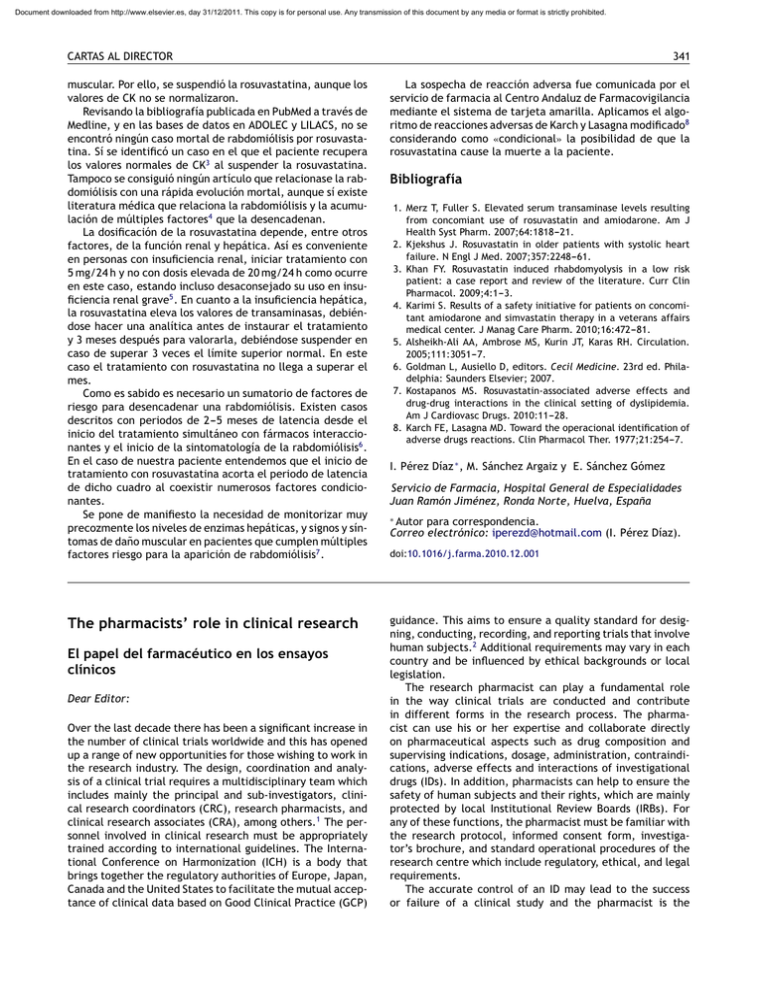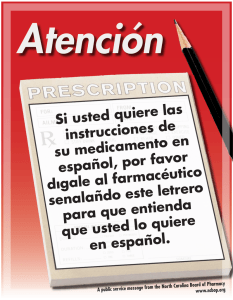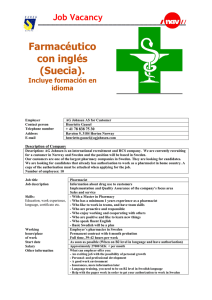The pharmacists` role in clinical research
Anuncio

Document downloaded from http://www.elsevier.es, day 31/12/2011. This copy is for personal use. Any transmission of this document by any media or format is strictly prohibited. CARTAS AL DIRECTOR 341 muscular. Por ello, se suspendió la rosuvastatina, aunque los valores de CK no se normalizaron. Revisando la bibliografía publicada en PubMed a través de Medline, y en las bases de datos en ADOLEC y LILACS, no se encontró ningún caso mortal de rabdomiólisis por rosuvastatina. Sí se identificó un caso en el que el paciente recupera los valores normales de CK3 al suspender la rosuvastatina. Tampoco se consiguió ningún artículo que relacionase la rabdomiólisis con una rápida evolución mortal, aunque sí existe literatura médica que relaciona la rabdomiólisis y la acumulación de múltiples factores4 que la desencadenan. La dosificación de la rosuvastatina depende, entre otros factores, de la función renal y hepática. Así es conveniente en personas con insuficiencia renal, iniciar tratamiento con 5 mg/24 h y no con dosis elevada de 20 mg/24 h como ocurre en este caso, estando incluso desaconsejado su uso en insuficiencia renal grave5 . En cuanto a la insuficiencia hepática, la rosuvastatina eleva los valores de transaminasas, debiéndose hacer una analítica antes de instaurar el tratamiento y 3 meses después para valorarla, debiéndose suspender en caso de superar 3 veces el límite superior normal. En este caso el tratamiento con rosuvastatina no llega a superar el mes. Como es sabido es necesario un sumatorio de factores de riesgo para desencadenar una rabdomiólisis. Existen casos descritos con periodos de 2---5 meses de latencia desde el inicio del tratamiento simultáneo con fármacos interaccionantes y el inicio de la sintomatología de la rabdomiólisis6 . En el caso de nuestra paciente entendemos que el inicio de tratamiento con rosuvastatina acorta el periodo de latencia de dicho cuadro al coexistir numerosos factores condicionantes. Se pone de manifiesto la necesidad de monitorizar muy precozmente los niveles de enzimas hepáticas, y signos y síntomas de daño muscular en pacientes que cumplen múltiples factores riesgo para la aparición de rabdomiólisis7 . La sospecha de reacción adversa fue comunicada por el servicio de farmacia al Centro Andaluz de Farmacovigilancia mediante el sistema de tarjeta amarilla. Aplicamos el algoritmo de reacciones adversas de Karch y Lasagna modificado8 considerando como «condicional» la posibilidad de que la rosuvastatina cause la muerte a la paciente. The pharmacists’ role in clinical research guidance. This aims to ensure a quality standard for designing, conducting, recording, and reporting trials that involve human subjects.2 Additional requirements may vary in each country and be influenced by ethical backgrounds or local legislation. The research pharmacist can play a fundamental role in the way clinical trials are conducted and contribute in different forms in the research process. The pharmacist can use his or her expertise and collaborate directly on pharmaceutical aspects such as drug composition and supervising indications, dosage, administration, contraindications, adverse effects and interactions of investigational drugs (IDs). In addition, pharmacists can help to ensure the safety of human subjects and their rights, which are mainly protected by local Institutional Review Boards (IRBs). For any of these functions, the pharmacist must be familiar with the research protocol, informed consent form, investigator’s brochure, and standard operational procedures of the research centre which include regulatory, ethical, and legal requirements. The accurate control of an ID may lead to the success or failure of a clinical study and the pharmacist is the El papel del farmacéutico en los ensayos clínicos Dear Editor: Over the last decade there has been a significant increase in the number of clinical trials worldwide and this has opened up a range of new opportunities for those wishing to work in the research industry. The design, coordination and analysis of a clinical trial requires a multidisciplinary team which includes mainly the principal and sub-investigators, clinical research coordinators (CRC), research pharmacists, and clinical research associates (CRA), among others.1 The personnel involved in clinical research must be appropriately trained according to international guidelines. The International Conference on Harmonization (ICH) is a body that brings together the regulatory authorities of Europe, Japan, Canada and the United States to facilitate the mutual acceptance of clinical data based on Good Clinical Practice (GCP) Bibliografía 1. Merz T, Fuller S. Elevated serum transaminase levels resulting from concomiant use of rosuvastatin and amiodarone. Am J Health Syst Pharm. 2007;64:1818---21. 2. Kjekshus J. Rosuvastatin in older patients with systolic heart failure. N Engl J Med. 2007;357:2248---61. 3. Khan FY. Rosuvastatin induced rhabdomyolysis in a low risk patient: a case report and review of the literature. Curr Clin Pharmacol. 2009;4:1---3. 4. Karimi S. Results of a safety initiative for patients on concomitant amiodarone and simvastatin therapy in a veterans affairs medical center. J Manag Care Pharm. 2010;16:472---81. 5. Alsheikh-Ali AA, Ambrose MS, Kurin JT, Karas RH. Circulation. 2005;111:3051---7. 6. Goldman L, Ausiello D, editors. Cecil Medicine. 23rd ed. Philadelphia: Saunders Elsevier; 2007. 7. Kostapanos MS. Rosuvastatin-associated adverse effects and drug-drug interactions in the clinical setting of dyslipidemia. Am J Cardiovasc Drugs. 2010:11---28. 8. Karch FE, Lasagna MD. Toward the operacional identification of adverse drugs reactions. Clin Pharmacol Ther. 1977;21:254---7. I. Pérez Díaz ∗ , M. Sánchez Argaiz y E. Sánchez Gómez Servicio de Farmacia, Hospital General de Especialidades Juan Ramón Jiménez, Ronda Norte, Huelva, España ∗ Autor para correspondencia. Correo electrónico: [email protected] (I. Pérez Díaz). doi:10.1016/j.farma.2010.12.001 Document downloaded from http://www.elsevier.es, day 31/12/2011. This copy is for personal use. Any transmission of this document by any media or format is strictly prohibited. 342 most suitable team member for this task. It is the pharmacists’ role to ensure that the drug receipt is recorded in the study documents or in the interactive voice response system. The pharmacist also has the primary responsibility of drug dispensing.3 It is very common within clinical trials for patients to make mistakes with their prescribed medication and, in many cases, the pharmacist is the first to detect and report this. The pharmacist should only dispense an adequate amount of ID to each subject and this amount should cover dose requirements until the next collect visit. The patient should be made aware of the need to return all unused medication. In order to ensure that the ID is in good condition for use, the pharmacist also has the duty to verify the drug product packaging and labelling, the drug substance analysis, pharmaceutical form, lot number, manufacturing and expiration dates, the correct use, handling and storing conditions, the drug administration routes and specific posology, and all dispensing, incinerating and handling procedures in the case of chemotherapy drugs. The pharmacist must ensure that the ID is stored according to the room conditions (temperature, light and humidity) determined by the sponsor. All data should be recorded on datasheets for future external audits. During receipt and shipment of IDs, the pharmacist should ensure that transport is performed according to the instructions specified by the sponsor. If there are any questions with regard to the quality or physical aspects of the ID, the pharmacist should not distribute the drug and must immediately contact the sponsor.4 It is very likely that that sort of oversight may arise during a number of these steps; therefore, the pharmacist in charge should be fully capable, committed and trained for that situation. Carelessness or lack of ability can cause serious problems for future development of ID. This is a growing area of interest to pharmaceutical companies and research centres worldwide and the search for competent and highly skilled professionals is rapidly growing. Alternatively to specifically working as a pharmacist in a research project, a newly graduated or senior pharmacist may prefer to work as a CRC. The CRC has the role of assisting the investigator to comply with the research project requirements, aiming to obtain reliable trial results and to ensure the welfare of the subjects involved in the study.5,6 Moreover, data quality is essential to guarantee that study data is reliable and complete in order to accurately assess the safety and effectiveness of IDs. The accuracy of data entry is verified by a CRA who is also responsible for evaluating if the clinical study has been conducted according to the GCP/ICH and the applicable laws. All clinical studies require continuous data and safety monitoring, which is sent to the Data Management Committee for each sponsor. By monitoring visits the CRA is able to act as a link between the sponsor and the research centre.7,8 Additionally, pharmacists can be IRB members or Ad Hoc Consultants, the latter may be invited to become a guest reviewer for the Board by the IRB Chair to review special categories of research not covered by the expertise of regular members. Currently, pharmacists are at the forefront of patient care and can have a significant impact on patient mana- CARTAS AL DIRECTOR gement. Moreover, the pharmacist may play a central role in the research process, which can influence directly the success of a clinical trial. However, in many countries, a graduated pharmacist may still have to struggle to find a job and, unfortunately, there remains a culture of not fully integrated into clinical research. In some cases it only occurs when the study sponsor is compelled by legislation to require the presence of a trained specialist. We hope to have emphasised in this short communication letter the growing role of the pharmacist in clinical research and their importance as skilled professionals in the scientific field. The increasing numbers of clinical trials also highlight that more trained personnel will be required and that pharmaceutical companies and research centres will need to appreciate the importance of this professional to a greater extent. Bibliografía 1. Hulley SB, Grady D. Implementing the Study and Quality Control. In: Hulley SB, Cummings SR, Browner WS, Grady DG, Newman TB, editors. Designing Clinical Research: An Epidemiologic Approach. 3rd edition. Philadelphia: Lippincott, Williams & Wilkins; 2007. p. 271---89. 2. ICH/GCP harmonized tripartite guideline for good clinical practice. Surrey: Brookwood Medical Publication; 1996. 3. Santos PM, Oliveira MG, Costa LA, Noblat L. Drug-related clinical research–a practical opportunity for the hospital pharmacist [In Spanish]. Farm Hosp. 2006;30:124---9. 4. Ganachari MS, Shah SP, Zalavadia NM. Pharmacist: a crucial part of clinical research. J Pharm Res. 2010;3:444---50. 5. Pelke S, Easa D. The role of the clinical research coordinator in multicenter clinical trials. J Obstet Gynecol Neonatal Nurs. 1997;26:279---85. 6. Lousana G, Accetturi C, Castilho VC. Guia Prático para Coordenadores de Estudos Clínicos. Interface. 2002;12:115---28. 7. Williams GW. The other side of clinical trial monitoring; assuring data quality and procedural adherence. Clin Trials. 2006;3:530---7. 8. Schwartsmann G, Wanders J, Koier IJ, Franklin HR, Dalesio O, Hornstra HW, et al. EORTC New Drug Development Office coordinating and monitoring programme for phase I and II trials with new anticancer agents. Eur J Cancer. 1991;27:1162---8. M. Moreira Lima Gamboa a,∗ , A. Tesainer Brunetto b , M.E. Ferreira Dos Santos c , L. Gregianin d a Pharmacist, Fellow in Training for Master Degree of the Federal University of Rio Grande do Sul, RS, Brazil b Medical Oncologist, Drug Development Unit, Royal Marsden Hospital, United Kingdom c Pharmacist-Biochemist, Specialisation in Hospital Pharmacy of the Pharmacists’ Association of Goias, GO, Brazil, Hospital de Clinicas de Porto Alegre, Porto Alegre, RS, Brazil d Pediatric Oncologist, Pediatric Oncology Unit, Hospital de Clinicas de Porto Alegre, Porto Alegre, RS, Brazil ∗ Autor para correspondencia. E-mail address: [email protected] (M. Moreira Lima Gamboa). doi:10.1016/j.farma.2010.10.006



